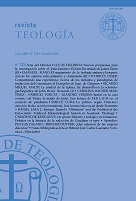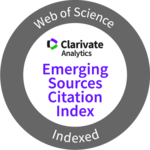Sharing an experience: About the methods and paradigms of translation of the Origen's Commentary on the Gospel of John
DOI:
https://doi.org/10.46553/teo.57.133.2020.p53-76Palavras-chave:
Orígenes, Traducción, Comentario al Evangelio de Juan, Métodos, ParadigmasResumo
All of us who work in the world of Late Antiquity in general and in Patristic Studies in particular know that translations are not simply the most exact possible translit- eration of a Greek or Latin word into Spanish. On the contrary, every translation hides a secret that can only be noticed when one has the opportunity to experience the fascinating and terrible challenge of such a task. This challenge consists of the audacity to let the titans of thought speak, such as Irenaeus, Origen, Augustine, etc. In this article, I will summarize the methods and paradigms through which I made the first translation into Spanish of the Commentary on the Gospel of John of Origen. I will always write in the first person, as I consider it my duty to commit myself to the criteria I chose, to allow the voice of the great Origen to be expressed. The criteria for translation that I will make explicit are the following: Research methods, The paradigm of relationality, The paradigm of biblical-philosophical continuity: The doctrine of the epinoias, The doctrine of pre-existence, The doctrine of apocatastasis, The divinization of Logos gifted beings.Downloads
Referências
Fuentes:
Orígenes, Comentario al Evangelio de Juan/l, Prólogo, F. García Ba- zán, Introducción, traducción y notas, Patricia, A. Ciner, Biblioteca de Patrística N° 115, Madrid: Ciudad Nueva 2020; Orígenes, Comentario al Evangelio de Juan/2, Introducción, traducción y notas, Patricia, A. Ciner, Biblioteca de Patrística N° 116, Madrid: Ciudad Nueva, 2020.
Platón, El Banquete, (México: Universidad Autónoma de México, 1947.
Estudios:
Brown, P., El Mundo en la Antigüedad Tardía, Madrid: Gredos, 1991.
Calvo, J., de Navascués, P. y Aroztegui Esnaola, M., Filiación, Madrid: Trotta, 2005.
Blosser, B., Become like the angels. Origen's Doctrine of the Soul , Washington: Catholic University of America Press, 2012.
Brown, P., El Mundo en la Antigüedad Tardía, Madrid: Gredos, 1991.
Caamaño, J. C., Giudice, H., (eds.), Patrística, Biblia y Teología. Caminos de diálogo, Buenos Aires: Agape, 2017.
Castagno, A., (director), Diccionario de Orígenes, Burgos: Monte Carmelo, 2003.
Ciner, P. Plotino y Orígenes. El Amor y la Unión Mística, Mendoza: Ed. Del Instituto de Filosofía, 2000.
Ciner, «Presencia de la Teología del Corazón en el pensamiento de Orígenes», en Estudios Patrísticos, Ediciones del IAPCH (2004), 21-44.
Ciner, P., «Una relectura del De Principiis a la luz del Comentario al Evangelio de Juan. La cuestión de la preexistencia» , en Teología y Vida, LV (2014), 263-285.
Ciner, P., Implicancias Teológicas y Místicas de la noción de Sabiduría en Orígenes Publicación del Centro de Estudios de Filosofía y Letras (2010), N° 6.
Crouzel, H., Origen et Plotin. Comparaisons doctrinales, Paris: Pierre Téqui,, 1991.
Crouzel, H. Orígenes. Un teólogo controvertido, Madrid: BAC, 1999.
García Bazán, F., La Biblioteca gnóstica de Nag Hammadi y los orígenes cristianos, Buenos Aires: El Hilo de Ariadna, 2013.
Hadot, P., Ejercidos espirituales y filosofía antigua Madrid: Siruela, 2006
Heine, R., Origen Scholarship in the Service of the Church, New York: Oxford University Press, 2010.
Luttikhuizen, P., La pluriformidad del cristianismo primitivo, Córdoba: El Almendro, 2002.
O'Leary, J., Christianisme et philosophie chez Origene, Paris: Cerf, 2011.
Orbe, A., La Epinoia. Algunos preliminares históricos de la distinción Kax'ánivoiav (En torno a la Filosofía de Leoncio Bizantino, Roame: Pontificia Universitas Gregoriana, 1955.
Rius Camps, J., El dinamismo Trinitario en la divinización de los seres racionales según Orígenes, Roma: Institutum Orientalium Studiorum, 1970.
Rius Camps, J., «Comunicabilidad de la Naturaleza de Dios según Orígenes» Roma: Orientalia Christiana Periodica, 1968.
Wolinski, «Le recours aus smvoiai du Christ dans le Commentaire sur Jean d' Origene», en Origeniana Sexta, en G. Dorival/ A. Le Boullec (eds.), Peeters, (1995),466-492.
Downloads
Publicado
Como Citar
Edição
Secção
Licença
Direitos de Autor (c) 2020 Teología

Este trabalho encontra-se publicado com a Licença Internacional Creative Commons Atribuição-NãoComercial-CompartilhaIgual 4.0.


















 Teología
Teología